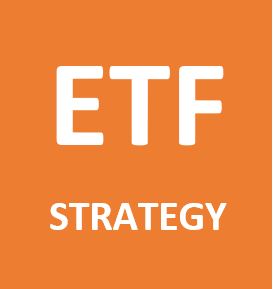ETF investing strategies for the investor (...rather than the speculator)

ETF investing strategies aren't easy to find, despite the fact that the use of ETFs has exploded over the last 15 years or so. Bloomberg estimates the total size of the ETF market to now be around $5 trillion.
With ETFs so cheap and easy to buy and sell, there is a danger they can be misused and become dangerous to the user. We explore some of the ways an investor, rather than a speculator, should use ETFs to invest their hard earned cash.
ETF investing strategies #1
Don't "trade" ETFs. Use them to invest
Make sure you don't "trade" ETFs. Use them to invest.
ETFs trade like stocks. You can buy or sell them whenever the market is open and you can often do it pretty cheaply. That said, we think you should look for ETFs that track an index (such as the famous SPY "SPIDER" ETF that tracks the S&P 500).
We think you should use these in exactly the same way you would use a traditional index fund and continuously buy a low cost ETF tracker whether the market goes up or down. You will receive your returns by steady earnings growth and consistent (and hopefully growing!) dividend payments. Most of these ETFs have very low expense ratios (often under 10 basis points) but make sure you check them!
ETF investing strategies #2
Don't go anywhere near leveraged ETFs
Leveraged ETFs are a recipe for disaster due to daily re-pricing. Here's an example:
Imagine you bought a 2x leveraged ETF. The price when you buy is 100. On day 1 the underlying security goes up 10% but then on day two the underlying security drops by 10%. Let's see what happens:
|
|
Unleveraged |
Leveraged |
As you can see, you've ended up $3 worse with the levered ETF and this is due to the daily re-pricing. This effect gets worse the longer you hold it and the more fluctuations you get.
Therefore dealing in leveraged ETFs is far too speculative for our liking.
ETF investing strategies #3
Be careful about the type of ETFs you go for
There are now over 2000 US listed ETFs alone.
The range of choice is incredible. you can track specific sectors, various indexes, commodities, and different asset classes (bonds, stocks, property, etc). Many of these are complicated and don't necessarily track a specific or consistent index.
This means some of these change their make-up or even go out of business quite quickly. Furthermore, they often don't necessarily have low costs. Always make sure you check out the underlying holdings of the ETF you go for and their prices.
ETF investing strategies #4
Keep it simple.
With so many options out there, it can be easy to overcomplicate. You should use ETFs if you don't want to do the work for individual stock picks and are happy to earn the market average returns (which remember will beat nearly every fund manager over time).
ETFs that track specific indices such as the S&P 500, FTSE 100, ASX 200, should perform very close to the levels of those indexes over time and pay you a dividend income. Just remember not to worry about short term market movements and keep investing. Some of our favorite ETFs include:
SPY - State Street S&P 500 index tracker.
VUKE - Vanguard FTSE 100 index tracker.
GLDV - State Street Global Dividend Aristocrats index tracker.
VTI - Vanguard Total Stock Market ETF.
SDY - State Street S&P high yield dividend aristocrats index tracker.
VAS - Vanguard Australian S&P/ASX 300 index tracker.
VHY - Vanguard FTSE Australia high dividend yield index.
VDY - Vanguard FTSE Canadian high dividend yield index.
ETFs can be very useful to the patient investor if used properly in much the same way traditional index funds have been great for the investor. If picking individual stocks isn't for you then you should seriously consider using index tracking ETFs as your main investment vehicles.
Got a BURNING dividend question for 6-figure dividend earner Mike Roberts?
What is it that you really want to know about investing?
Submit a query and Mike will write a page in response.
PLEASE NOTE - in accordance with our terms of use, responses are meant for education / interest only. We do not give specific financial advice.



